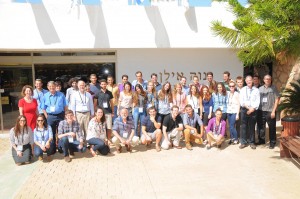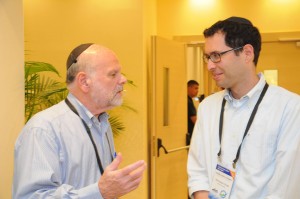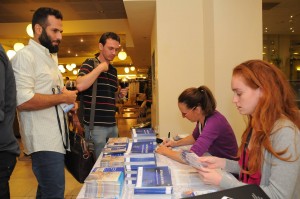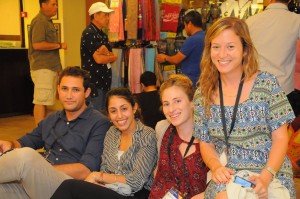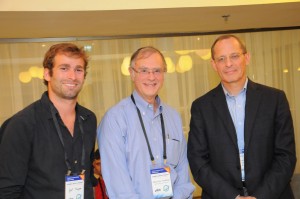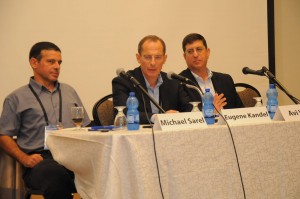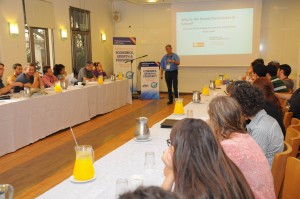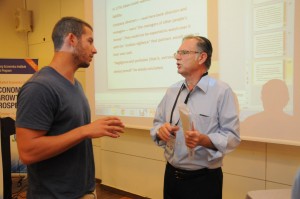Location: Neve Ilan Hotel
All expenses paid
The Application period for fall seminar 2015 has ended.
What is economic freedom? Why is it important and how does it produce growth and prosperity? Listen, learn, and discuss with some of the best economists and leading policy makers from around the world. Open to students from any field of study, who aspire to leadership, and have completed at least first year undergraduate studies.The Application period for fall seminar 2015 has ended.
Sunday, October 11
Monday, October 12
Tuesday, October 13
Wednesday, October 14
Thursday, October 15
Binyamin Zomer
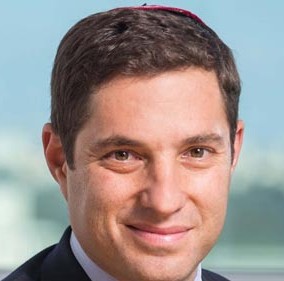
Binyamin (Bini) Zomer has been appointed to Noble Energy Country Manager in Israel on September 2014. Prior to that, he served as Noble Energy’s Director of Corporate Affairs in Israel since January 2010. In that capacity, Bini was responsible for Noble’s government relations, media relations and corporate social responsibility projects. His responsibilities also include a number of commercial endeavors. In 2014, Bini added the role of Joint Venture Manager to his responsibilities. As JV Manager, Bini is responsible managing the business relationship between the various partnerships that Noble operates off-shore Israel.
Prior to joining Noble, Bini served as Deputy Director for Policy and Government Affairs at the American Israel Public Affairs Committee (AIPAC) where he focused on energy and homeland security issues. Before joining AIPAC, Bini was Director of Federal Government Relations at Accenture LLP and before that served as Counsel to Don Nickles, US Senator from Oklahoma, after practicing law in Chicago. Bini has a Law degree from the Washington University School of Law in St. Louis and a B.A. in Government from the University of Texas.
Bini and his wife, Heather, made Aliyah in 2010 and reside in Modi’in with their four daughters.
Peter Lewin

Peter Lewin is Clinical Professor of managerial economics in the Jindal School of Management, University of Texas, Dallas. He received a Ph.D. in economics at the University of Chicago, where he studied with Nobel prize winning economists Milton Friedman and Gary Becker. His teaching and writing includes monetary policy and business-cycles, regulation of business, and the historical development of economics. Though a graduate of Chicago, he has retained an interest in the Austrian school and its ability to understand the real world economy and economic policies that affect our lives. Dr. Lewin was born and raised in South Africa under the Apartheid government of state-enforced racism – which became the subject of his Ph.D. dissertation.
The Closing of the Economist’s Mind

Why do we Repeat the mistakes of history?

Lawrence H. White

Lawrence H. White is Professor of Economics at George Mason University and a Senior Fellow of the F. A. Hayek Program for Advanced Study in Philosophy, Politics, and Economics at the Mercatus Center.
His latest books are The Clash of Economic Ideas (Cambridge University Press, 2012) and (as co-editor) Renewing the Search for a Monetary Constitution (Cato Institute, 2015).
Best known for his work on free banking, White is also author of The Theory of Monetary Institutions (1999), Free Banking in Britain (2nd ed., 1995), and Competition and Currency (1989). His research on monetary theory and banking history has appeared in the American Economic Review, Journal of Monetary Economics, and other leading economics journals. His popular writings have appeared in The Wall St. Journal and elsewhere.
The Evolution of Money, Banking, and Central Banking

Business Cycles and the Great Recession

Robert A. Lawson

Robert Lawson holds the Jerome M. Fullinwider Endowed Centennial Chair in Economic Freedom and is the Director of the O’Neil Center for Global Markets and Freedom in the Cox School of Business at Southern Methodist University in Dallas, Texas. Prior to SMU, he taught at Auburn University, Capital University, and Shawnee State University. Dr. Lawson is a co-author of the widely-cited Economic Freedom of the World annual reports, which present an economic freedom index for over 150 countries. Lawson has numerous professional publications in journals including Public Choice, Journal of Economic Behavior and Organization, Cato Journal, Kyklos, Journal of Labor Research, Journal of Institutional and Theoretical Economics, and European Journal of Political Economy. Lawson is past-president of the Association of Private Enterprise Education, a Senior Fellow at the Fraser Institute, and a member of the Mont Pelerin Society. He earned his B.S. in economics from the Honors Tutorial College at Ohio University and his M.S. and Ph.D. in economics from Florida State University. In his spare time, he enjoys running marathons and ultramarathons, mountaineering, vintage base ball, and cooking.
Economic Freedom and the Wealth and Health of Nations

The Hayek-Friedman Economic/Political Freedom Hypothesis: How Does Israel Rate?

Diana Furchtgott-Roth
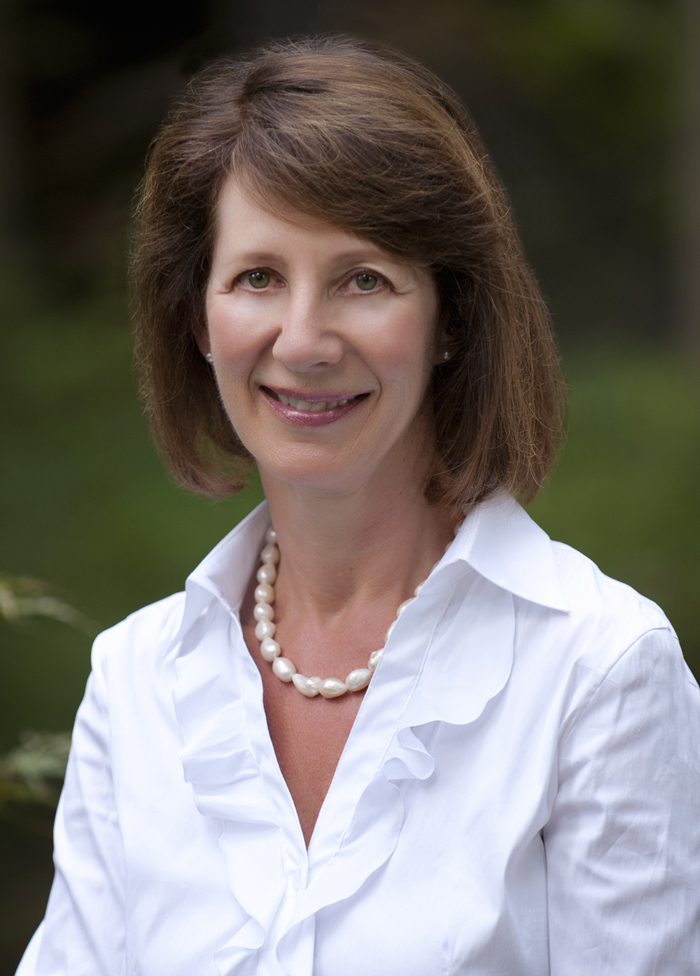
Diana Furchtgott-Roth, former chief economist of the U.S. Department of Labor, is director of Economics21 and senior fellow at the Manhattan Institute for Policy Research. She is a columnist for MarketWatch.com, and Tax Notes. From 2003 to 2005, Ms. Furchtgott-Roth was chief economist of the U.S. Department of Labor. From 2001 to 2002 she served as chief of staff of President George W. Bush’s Council of Economic Advisers. Ms. Furchtgott-Roth served as deputy executive director of the Domestic Policy Council and associate director of the Office of Policy Planning in the White House under President George H.W. Bush from 1991 to 1993, and she was an economist on the staff of President Reagan’s Council of Economic Advisers from 1986 to 1987.
Ms. Furchtgott-Roth is the author of five books, most recently Disinherited: How Washington Is Betraying America’s Young (Encounter Books, 2015), coauthored with Jared Meyer. She has also written Regulating to Disaster: How Green Jobs Policies Are Damaging America’s Economy (Encounter Books 2012), Women’s Figures: An Illustrated Guide to the Economic Progress of Women In America (AEI Press, 2012), and Overcoming Barriers to Entrepreneurship in the United States (Lexington Books, 2008).
Ms. Furchtgott-Roth has degrees in economics from Swarthmore College and Oxford University.
Economic Inequality: Does it matter? What to do? – part 1

part 2

The Minimum Wage: A Solution or a Problem?

Albert Dov Friedberg

Albert Dov Friedberg was born in Lyon, France in 1946 and was raised in Uruguay, South America. He has a B.A. degree in Economics from the John Hopkins University, an M.B.A. degree in International Banking from Columbia University and a Ph.D. degree in Near Eastern and Middle Eastern Civilizations from the University of Toronto.
Albert Friedberg is principal shareholder of Friedberg Mercantile Group Ltd., a Toronto-based investment firm.
From 1971 until 2004 he wrote and published a monthly analysis of world economic trends, investment strategies and policy entitled “Friedberg’s Commodity & Currency Comments.” He was appointed by the Premier of the Province of Ontario as one of five members of the Commodity Futures Advisory Board of Ontario (1979) and served as Chairman of the Toronto Futures Exchange for three terms.
He has been published in a number of academic journals, primarily on Bible, Jewish Medieval theology and exegesis, and rabbinics and has written articles on various business matters.
What’s gone wrong with banking?

Panel discussion: Israel’s Path to Economic and Social Prosperity

Michael Sarel

Dr. Sarel is a Senior Fellow with the Kohelet Forum. He served until March 2014 as the Chief Economist and director of state revenue, research and international affairs at Israel’s Ministry of Finance. He obtained his doctoral degree from Harvard where he was also a teaching fellow. Sarel worked in the World Bank, International Monetary Fund, The Bank of Israel, in the Ministry of Finance as head of the research department and in Harel Insurance and Finance Group as the head of the economics and research department.
Avi Weiss

Prof. Weiss holds a doctoral degree from the University of Chicago. He has presided as a member of the senior faculty of Bar-Ilan University since 1988 and served as Chair of the Economics Department between 2005 and 2008. His area of expertise is Applied Economics and his research focuses on industrial organization, antitrust, labor economics, law and economics, and behavioral and experimental economics. Weiss is the editor of The Economic Quarterly – the journal of the Israel Economic Association – and is an associate editor of Economic Inquiry.
In the public domain, Prof. Weiss served as Chief Economist and Deputy Director of the Israel Antitrust Authority between 2003-2005; was a member of the Anti-Dumping Commission of the Ministry of Industry and Trade between 1999-2003; served as a member of the Subcommittee on the Cost of Living and Competition of the Trajtenberg Commission on Social and Economic Change; and acted as a consulting member of the Bachar Intra-Agency Committee for Reform of the Financial Sector. Today he is a member of the Competition Task Force of Israel’s Grand Strategy Forum. Prof. Weiss has been a research fellow at IZA (a labor market research center) in Germany since 2000.
Throughout his academic career, Weiss has published more than forty articles in refereed journals and professional books.
Eugene Kandel
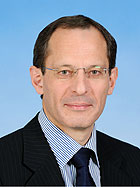
Professor Eugene Kandel has been serving as Head of the National Economic Council in the Prime Minister’s Office and Economic Adviser to the Prime Minister since July 2009. Professor Kandel has both a BA and an MA in economics from the Hebrew University and an MBA and doctorate in economics from the University of Chicago.
Professor Kandel has worked for years to shape economic policy in Israel and was a member of central public committees such as the Hamdani Committee and the Ariav Committee. Professor Kandel served as an adviser to governmental bodies, financial institutions and economic organizations around the world. In this framework, he worked to design regulatory systems, evaluate the profitability of corporations, develop optimal pricing policy, etc., as well as strategic and financial consultation. Professor Kendal also served as a member of Israel’s antitrust court and as the chairman of investment committees of pension funds and provident funds in Israel.
Professor Kandel is a senior professor at the Hebrew University Business School and Economic Department, and in the past served as the Chair of the Economic Department. Previously he worked in leading institutions around the world, including the University of Chicago, the University of Rochester and Washington University. Prof. Kandel is also a member of the Center for the Study of Rationality in the Hebrew University, a research fellow of the Centre for Economic Policy and Research in London and a fellow of the European Corporate Governance Institute.
Israel’s Path to Economic and Social Prosperity

